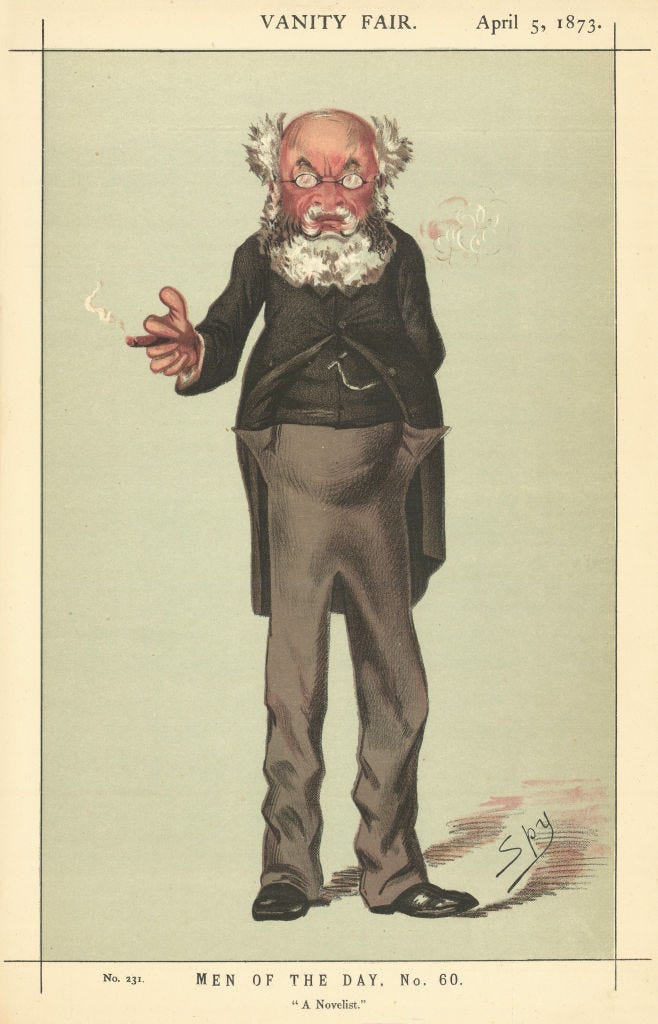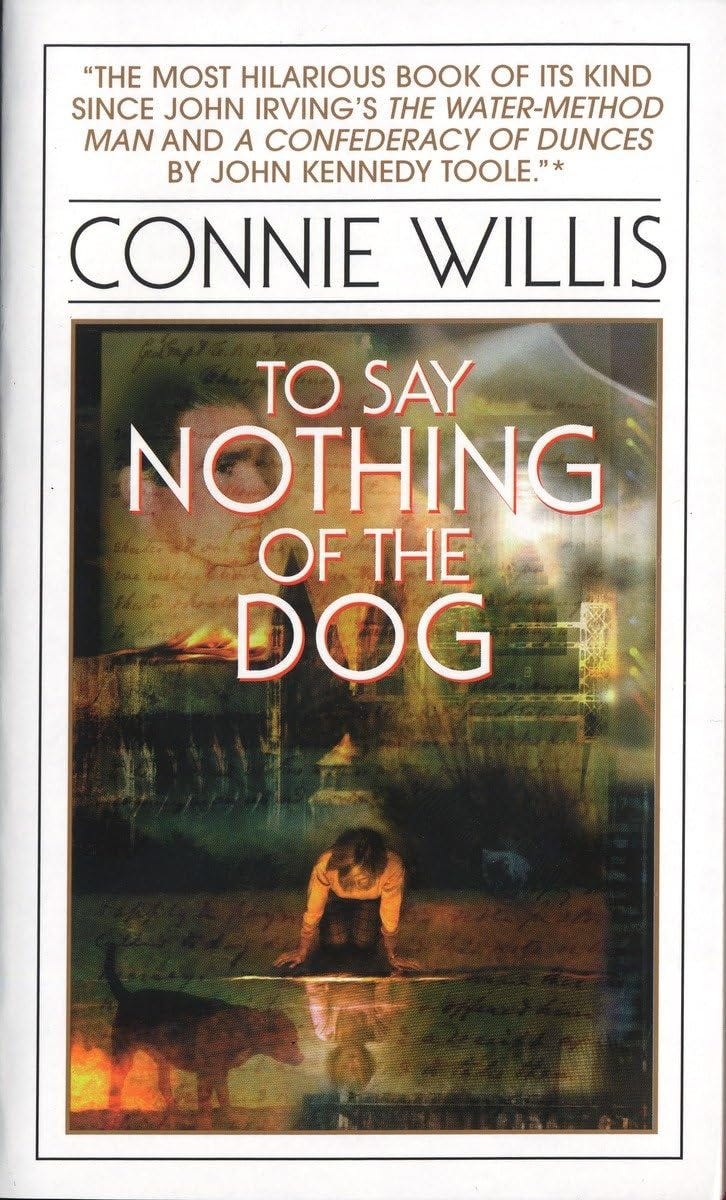Gentle readers: Last year at this time, I introduced you to a practice called Victober. Its baseline requirement: Read one work of Victorian literature during the month of October—a book from the United Kingdom [England, Northern Ireland, Scotland, Wales] or Ireland, published during Queen Victoria’s reign [1837 to 1901].
C’est tout. That’s it.
If you’d like to wade in a bit deeper, listen to YouTube posts by this year’s presenters: Katie Lumsden,1 Kate Howe, Ros from Scallydandling, and Marissa from Blatantly Bookish.2 They offer individual challenges, also a group read, etc.
Concerning Victober 2023:
Last year, I got the distinct impression that a non-zero number of you felt I’d been—how to put this?—led down the garden path by a pack of daffy British ladies. To that churlish accusation I can but reply: Why yes, yes I was!
[And I mean “daffy” in the best possible way.]
Thing is, I’d been primed by my own quest, Reading Back in Time (aka, David’s Insane Reading Project3). I’d seen how assigning yourself projects is a semi-painless means of tricking yourself into reading a slew of classics you turned up your nose at theretofore4 —on account of their being, you know, fusty/stodgy/unhip/culturally obsolete/of no present-day relevance/not to mention way too long, etc., etc.
Of course, it depends on why you’re reading.
Sometimes I read to occupy my mind with “that which isn’t me/my troubles.”
Sometimes, as a writer, I read to link arms with all other writers. Sometimes I read with the fond hope that the splendid sentence-craft of others will rub off on me.5
I read, further, because I’m curious about how life is/was lived elsewhere in space and time. This is garden-variety curiosity in part, but also curiosity based on believing that being a good human means looking outward, noting samenesses and differences, witnessing what others had to/have to endure because of where they live and when they live, seeing in granular detail what happened when certain new elements were added to the story—industrialization, antibiotics, women’s suffrage, machine computation, TikTok . . . yet (why end a good sentence when it’s just getting up a good head of steam?), the more time I spend in the past via reading (as well as genealogy and archaeology), the more convinced I am that our forebears, even the far-back sort, were fundamentally like us.6
I remember once reading Juvenal’s Satires and finding that what late-1st C. Romans thought worthy of skewering, we still do—pompous windbags, charlatans, the clueless rich and entitled, tightwads, boors, etc.
Ditto for scenes throughout Joseph Andrews [Henry Fielding, 1742], The Life and Opinions of Tristram Shandy, Gentleman [Laurence Sterne, 1760-66], and The Expedition of Humphry Clinker [Tobias Smollett, 1771]—unadulterated slapstick7, prefiguring Laurel and Hardy, Buster Keaton, et al.
In any case, if you think the Victorians had their day, and that you should be immersing yourself in the work of today’s writers, I get that.8 And I get that Victober’s not for everyone (including, most likely, my 20-something/30-something self).
Then again, maybe you’re ripe for a break from the here and now . . .
My Victober 2023:
The Small House at Allington, Anthony Trollope (1864)
Framley Parsonage, Anthony Trollope (1861)
Agnes Grey, Anne Brontë (1847)
My Victober 2024 (proposed):
The Prime Minister, Anthony Trollope (1876)
The Claverings, Anthony Trollope (1867)
East Lynne, Ellen Wood (1861)
Olive, Dinah Craik (1850)
David’s Alternative Victober 2024 Challenge:
As noted, you can meet Victober’s entry-level requirement by reading one work during October . . . or visit the presenters’ websites and dive in deeper.
My challenge lets you take a whole calendar year. It comes in two sizes: full and half—a book every month or a book every two months.
As follows:
1. The Brontë Sisters:
Read Jane Eyre, Charlotte Brontë (1847)
Read one of these:
Villette, Charlotte Brontë (1853)
Shirley, Charlotte Brontë (1849)
The Tenant of Wildfell Hall, Anne Brontë (1848)
Agnes Grey, Anne Brontë (1847)
Wuthering Heights, Emily Brontë (1847)
2. Charles Dickens:
Read one of these:
Our Mutual Friend (1865)
A Tale of Two Cities (1859)
Bleak House (1853)9
David Copperfield, (1850)
3. Elizabeth Gaskell:
Read one of these:
Wives and Daughters (1866)
North and South (1855)
Cranford (1853)
4. Anthony Trollope
Read one of these:
The Prime Minister [Palliser/Parliamentary Series #5] (1876)
The Way We Live Now (1875)
Can You Forgive Her? [Palliser/Parliamentary Series #1] (1865)
The Small House at Allington [Barsetshire Series #5] (1864)
Orley Farm (1862)
5. “The New Woman”:
Read one of these:
Red Pottage, Mary Cholmondeley (1899)10
The Woman Who Did, Grant Allen (1895)
Daughters of Danaus, Mona Caird [Mona Alison] (1894)
The Story of a Modern Woman, Ella Hepworth Dixon (1894)
Trilby, George du Maurier (1894)
The Odd Women, George Gissing (1893)11
6. Victorian Speculative Lit:
Read one of these:
Dracula, Bram Stoker (1897)
The Time Machine, H. G. Wells (1895)
The Picture of Dorian Gray, Oscar Wilde (1891)
She, H. Rider Haggard (1887)
Dr. Jekyll and Mr. Hyde, Robert Louis Stevenson (1886)
After London, Richard Jeffries (1885)
Erewhon, Samuel Butler (1872)
7. Victorian Adventure:
Read one of these:
Kim, Rudyard Kipling (1901)
The Invisible Man, H. G. Wells (1897)
The Prisoner of Zenda, Anthony Hope (1894)
The Man Who Would Be King, Rudyard Kipling (1888)
She, H. Rider Haggard (1887)
Kidnapped, Robert Louis Stevenson (1886)
King Solomon’s Mines, H. Rider Haggard (1885)
Treasure Island, Robert Louis Stevenson (1883)
A Thousand Miles Up the Nile [nonfiction], Amelia B. Edwards (1877)
Alice’s Adventures in Wonderland, Lewis Carroll (1865)
8. A Miscellany of Other Victorians:
Read two of these:
Esther Waters, George Moore (1899)
A Child of the Jago, Arthur Morrison (1896)
The Diary of a Nobody, George and Weedon Grossmith (1892)
New Grub Street, George Gissing (1891)
Tess of the D’Urbervilles, Thomas Hardy (1891)
Three Men in a Boat, Jerome K. Jerome (1889)12
Signa, Ouida (1885)13
Far From the Madding Crowd, Thomas Hardy (1874)
Middlemarch, George Eliot (1871-72)
The Moonstone, Wilkie Collins (1868)
Miss Marjoribanks, Margaret Oliphant (1866)
Lady Audley’s Secret, Mary Elizabeth Braddon (1862)
The Mill on the Floss, George Eliot (1860)
Vanity Fair, William Makepeace Thackery (1848)14
Extra Credit:
Read a “Sensation Novel” (pop-lit genre c. 1860s-1880s):
https://en.wikipedia.org/wiki/Sensation_novel
https://www.goodreads.com/list/show/164282.Victorian_Sensation_Novels
https://shereadsnovels.com/category/reviews/sensation-novels/
https://thelibrary.org/kids/books/booklist.cfm?listid=976
A list of Victorian bestsellers, 1862-1901:
https://victorianweb.org/victorian/authors/dickens/pva/pva120.html
Lumsden: Last year, I referred to her as my “gateway drug”; I see no reason to alter that. Her enthusiasm is irresistible. Also, she just published her second novel, The Trouble With Mrs. Montgomery Hurst [the other is The Secrets of Hartwood Hall (2023)].
Presenters: Other Victober presenters are linked at Katie’s.
Theretofore: Yes, this is a word. Looked it up.
Rubbing off: It has. Probably, at some point in the history of people learning how to write, someone has studied the work of a master, learned a specific technique, then applied it directly to his/her/their writing . . . but “rubbing off on” is a better expression of what happened in my case. It’s more like semi-conscious absorption/osmosis/ear training. And, crucially, this accumulation comes from writers with wildly divergent voices.
Like Us: Why do I keep needing to be reminded of this? Why do we continue to think we live at the end of history, that everything before our time was precursor, that we are the fulfillment/completion of our incomplete forbears—when, of course, we know better? The fate of the Earth is so precarious these days that obsessive “end times” thinking feels warranted—simply rational, mindful—but we forget that people throughout the tiers of time and circumstance have felt themselves on the cusp of apocalypse.
Slapstick: Example? Sure. Smollett’s novel has a nobleman’s entourage visiting a string of other noblemen’s estates; one night, a “fire alarm” is staged, obliging the noble guest to climb down a ladder in his nightshirt, affording the crowd gathered below a view of his bare bum.
Today’s writers: I’ve read some great 2023/2024 stuff recently: The Waters, Bonnie Jo Campbell, Monsters: A Fan’s Dilemma [essay], Claire Dederer, This Other Eden, Paul Harding, I Have Some Questions For You, Rebecca Makkai, North Woods, Daniel Mason, The Heaven and Earth Grocery Store, James McBride, The Bee Sting, Paul Murray, Tom Lake, Ann Patchett, Lo-Fi, Liz Riggs, Leaving, Roxana Robinson, Tomorrow, and Tomorrow, and Tomorrow, Gabrielle Zevin . . . and Sally Rooney’s, Intermezzo, is enroute from Bookshop.org.
Bleak: Whether or not you read this one, read the opening page—great writing, great wit!
Mary Cholmondeley: Pronounced (more or less), Chumley.
“The New Woman”:
https://en.wikipedia.org/wiki/New_Woman
https://victorianweb.org/gender/diniejko1.html
https://www.amazon.com/new-woman-Sally-Ledger/dp/0719040930
Ouida:
https://en.wikipedia.org/wiki/Ouida
Vanity Fair: Becky Sharp!








So many of these are sitting on my shelves; think I’ll give your challenge a go. Thanks for the inspiration!
Thanks, David, for bringing bookshop.org to my attention! (See, some people do read your footnotes.)
Last fall I bought Bleak House...this fall I may read it. Currently knee-deep in current fiction, though.